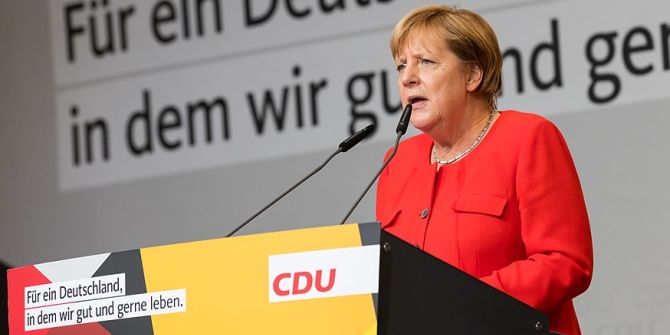Today, politics based on a religious mindset are likely to seem conservative, even reactionary or pre-modern. Yet, Christian thinking is a key factor in modern European state-building. Fabian Kröning looks back at German history after 1945 to show the crucial impact of a ‘Christian-social’ policy and how it undermined the common political scheme of ‘conservative’ vs. ‘progressive’.

In their government programme for the Bundestag elections in September 2017, the CDU/CSU speak of their political rootedness in so called Christian-social values. However, in looking at the programme as a whole, this claim turns out to be rather empty. The text remains vague about what is meant by that category, and it doesn’t credibly explain how those values are implemented and embodied in an actual political agenda. This is even more striking as both parties have ‘Christian’ in their name. Today, in an ever-more-secularised political discourse, the emphasis of those attributes commonly suggests a conservative and rather backward-looking political attitude. At the same time, there is some serious doubt about whether the policy of the parties with the ‘C’ in their name can still be considered legitimately ‘Christian’.
This was not always the case: In the years following the Second World War, Christian churches in Germany experienced massive growth. In a time of great psychosocial unsettledness, they not only served as a spiritual shelter, but also as a widely accepted authority faced with the social and political rebuilding of the country. The Catholic Church enjoyed an especially high level of credibility as it had been much more resistant to the Nazi regime than the Protestant church. With the tradition of Catholic social teaching (CST) it also provided a comprehensive set of ethical propositions for a stable and just society: Reaching back to the late 19th century, the concept of CST originates in the Church’s attempt to deal with the social (and individual) estrangement of modern mankind following the breakthrough of industrialisation in Europe. To that end, Church authorities gradually published a variety of ecclesiastical encyclicals, theological theorems and social principles (such as ‘personality’, ‘solidarity’ and ‘subsidiarity’) – all labelled today under the name of CST.
When Christian thinkers and politicians first took up this tradition after 1945, they could not by any means have been labelled “right” or “conservative”: Intellectuals like Eugen Kogon and Walter Dirks, editors of the influential political journal “Frankfurter Hefte”, profiled a radical left Catholicism in German political thinking that was very close to socialist concepts but based upon Christian revelation as its source of meaning. In 1947 – seventy years before the current programme – the newly-founded Christian Democratic Union released their “programme of Ahlen”. What the young CDU proclaimed in this manifesto was nothing less than a “Christian socialism”. Under the telling motto “CDU overcomes Capitalism and Marxism” the programme postulated a socio-economic constitution for Germany that should get beyond the dominating political ideologies of ‘West’ and ‘East’:
“The capitalist economic system did not do justice to the vital state and social interests of the German people. After the terrible political, economic and social breakdown as a result of criminal power politics only a new order from the ground up can take place. Matter and intent of this new social and economic system cannot be the capitalist yearn for profit and power anymore, but only the weal of our people. Through a common order the German people shall have an economic and social constitution, that complies with the right and dignity of man, serves the spiritual and material buildup of our people and saves the inner and outer peace.”
Being decidedly anti-capitalist and in favour of a partially planned economy, the “programme of Ahlen” refused at the same time a state socialism of a communist nature. Accordingly, it did not favour total collectivisation, but rather a trade union and cooperative-based order of economic conditions; furthermore, a partial public ownership of big industry with strong rights of co-determination by the state. However, this ‘third way’ beside communism and capitalism did not get beyond the state of a political utopia: The rapid consolidation of the Eastern and Western Blocs pushed German politicians to choose between two rival systems and eventually resulted in the foundation of two separate states. Within the CDU, the left wing under Jakob Kaiser, leading figure behind the “programme of Ahlen”, was overthrown by Konrad Adenauer, who took a less radical and capitalist-friendly position. Adenauer consequently supported Western integration and soon after became the first chancellor of the German Federal Republic.
In this new German state a “Socialism out of Christian responsibility”, as Jacob Kaiser once put it, no longer had a chance of becoming reality. Nevertheless, Catholic social teaching still had a crucial impact on West Germany’s political history. Christian thinkers like Oswald von Nell-Breuning, the “doyen of Catholic social teaching”, served as ethical advisors of governments, parties and labour unions and thereby influenced the politico-economic development of West Germany within the meaning of CST.
Catholic social teaching, to give an important example, provided an ethical justification for what today is commonly known as the ‘social market economy’: In fact, CST at first partially accepted the dominating paradigm of neo-liberalism. The Christian-social principles of personal freedom and subsidiarity gave legitimacy to the concept of the free market. However, CST always warned about the social injustice that a pure neo-liberal order was inevitably provoking. Therefore, it demanded a social disciplining of the free market and, further, a fundamental intertwining of economic and social policy. The ethical basis for this approach should be the principle of interpersonal solidarity as a fundamental precondition of social cohesion: a community had a moral responsibility for every single person within society and should guarantee a life in dignity to each of its members. Every individual was therefore obligated to always act in respect of the welfare of the whole community.
To what extent do principles like ‘solidarity’, which once laid the socio-ethical ground of the German Federal Republic, still comply with today’s socio-political reality? Looking at soaring social inequality and an increasing distrust of political elites, the answer does not seem to be positive. In this situation, it is primarily up to those politicians who call themselves ‘Christian’ to assess their own principles. As the early history of the CDU has shown, it is possible – and sometimes even necessary – to free oneself of thinking in common categories such as ‘left’ or ‘right’, ‘progressive’ or ‘conservative’.
About the author
 Fabian Kröning studied History, History of Arts and Political Sciences at the University of Dresden (Bachelors) and Medieval Studies at the University of Cologne (Masters). Since 2017 he has been a PhD student in History of Arts at the University of Cologne. His research project focuses on the Catholic architect and urban planner Josef Lehmbrock (1917-1996) and, in this context, especially on the influence Catholic Social Teaching had on post-war architectural housing programmes in Germany.
Fabian Kröning studied History, History of Arts and Political Sciences at the University of Dresden (Bachelors) and Medieval Studies at the University of Cologne (Masters). Since 2017 he has been a PhD student in History of Arts at the University of Cologne. His research project focuses on the Catholic architect and urban planner Josef Lehmbrock (1917-1996) and, in this context, especially on the influence Catholic Social Teaching had on post-war architectural housing programmes in Germany.
Note: This piece gives the views of the author, and not the position of the LSE Religion and Global Society blog, nor of the London School of Economics.





